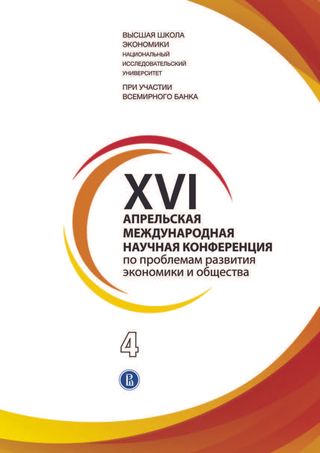?
Гордость человека за свою страну: индивидуальные и страновые детерминанты
С. 53–62.
Magun V., Fabrykant M.
Language:
Russian
Publication based on the results of:
In book

XVI Апрельская международная научная конференция по проблемам развития экономики и общества: в 4 кн.
Кн. 4. , М.: Издательский дом НИУ ВШЭ, 2016.
Sorokina A., Maximenkova M., Kasamara V., / NRU Higher School of Economics. Series PS "Political Science". 2019. No. 71.
The paper examines collective memory of British and Russian youth. The authors use the results of surveys conducted among Russian and British students. They focus primarily on the structure of pride in the collective memory of young people. They propose to analyze the category of pride among young people across several dimensions. First, they look ...
Added: December 16, 2019
Zubarev N., Полития: Анализ. Хроника. Прогноз 2023 № 1(108) С. 126–140
How do leaders of non-democratic states retain support of the population? One of the most popular explanations in the modern Political Science suggests that people in non-democratic countries vote for incumbents and generally have a positive attitude towards them, because the latter possess maximum access to resources that can potentially be directed to improve the ...
Added: August 31, 2023
Belianin A. V., The Review of Economics and Statistics 2018 Vol. 100 No. 4 P. 664–677
Ambiguity attitudes have been prominently used in economic models, but we still know little about their demographic correlates or their generalizability beyond the West. We analyze the ambiguity attitudes of almost 3,000 students across thirty countries. For gains, we find ambiguity aversion everywhere, while ambiguity aversion is much weaker for losses. Ambiguity attitudes change systematically ...
Added: February 20, 2018
Камалов Э. А., Ponarin E., Мониторинг общественного мнения: Экономические и социальные перемены 2020 № 1 С. 177–205
Since the beginning of the 2000s, subjective well-being of the Russians was growing due to growing incomes and strengthening optimism about the future. However, the worsening economic situation following the crisis in 2008 did not cause the expected fall in subjective well-being rates. One plausible explanation is the growth of national pride. In this paper, it is tested whether or not national pride positively and causally ...
Added: March 2, 2020
Fabrykant M., Magun V., Nationalities Papers: The Journal of Nationalism and Ethnicity 2019 Vol. 47 No. 1 P. 20–37
The article examines a key attribute of Russian national identity—national pride—as it is reflected in mass consciousness. To trace the dynamics of multiple facets of national pride and related phenomena from 1996 to 2015, we use data from five surveys. The results demonstrate a substantial growth in Russian national pride in specific country achievements and ...
Added: January 29, 2019
Зубарев Н. С., Полития: Анализ. Хроника. Прогноз 2023 Т. 108 № 1 С. 126–140
How do leaders of non-democratic states retain support of
the population? One of the most popular explanations in the modern Political
Science suggests that people in non-democratic countries vote for incumbents
and generally have a positive attitude towards them, because the latter possess
maximum access to resources that can potentially be directed to improve the
lives of the people. However, ...
Added: April 18, 2023
Fabrykant M., Journal of Social Policy Studies 2016 Vol. 14 No. 4 P. 583–596
This research considers how representations of the social security system can be a source of national pride. It aims to uncover the specific features of pride in the social security system by estimating the effects of various factors based on cross-national evidence from the International Social Survey Program – National Identity and multiple country-level measurements ...
Added: January 16, 2017
Almakaeva A., Гашенина Н., Мониторинг общественного мнения: Экономические и социальные перемены 2020 Т. 155 № 1 С. 4–13
The current paper provides a brief overview of subjective well-being studies in Russia. The authors analyze definitions and measurement of such concepts as «subjective quality of life», «social mood», «social well-being». The concept of «social well-being», which has the widest application among Russian social researchers, has two possible interpretations. Only its narrow interpretation can be ...
Added: August 10, 2020
Zubarev N., Moreva Y., Ponarin E., Полис. Политические исследования 2024 № 4 С. 56–70
Happiness in Russia recovered rapidly along with economic growth between 1999–2008 after a sharp
decline in the 1990s. Surprisingly, however, the economic stagnation that followed did not prevent further
growth in happiness levels, which reached a historic peak by the end of 2017. Using data from the World Values
Survey and the European Values Study for the period ...
Added: July 26, 2024
Monusova G., В кн.: XIII Международная научная конференция по проблемам развития экономики и общества. В 4 кн. Кн. 3.Кн. 3. М.: Издательский дом НИУ ВШЭ, 2012. С. 49–61.
В главе на базе данных Европейского Социального Исследования (ESS-2008) анализируются запросы населения европейских стран на социальную политику государства, готовность участвовать в ее софинансировании и расхождение между этими показателями. Готовность населения к увеличению налогов, необходимых для финансирования социальной политики государства, а также разность между запросами и готовностью к увеличению налогов значимо зависят от тех институциональных характеристик, ...
Added: January 29, 2013
Fabrykant M., Magun V., , in: Dynamics of National Identity: Media and Societal Factors of What We Are. L.: Routledge, 2016. Ch. 6 P. 83–112.
The chapter presents individual and country level factors of two types of national pride derived from D.Kahneman theory of human cognition. The multilevel regression anaysis of the ISSp-2003 data shows that the two types of national pride are primarily determined by different sets of factors. ...
Added: March 24, 2016
Voronina N., Lytkina E., Подстрешная Е. С., Форсайт 2015
Тематика социальной сплоченности уже давно перестала быть уделом исключительно социологии или социальной психологии, и стала затрагиваться в таких документах регионального и международного масштаба, как Маастрихтский договор Евросоюза (1992 г.), Новая повестка социальной политики ОБСЕ (The New Social Policy Agenda (OECD, 1996)), Стратегия социальной сплоченности Совета Европы (The Council of Europe’s Strategy for Social Cohesion, 2000) ...
Added: October 19, 2015